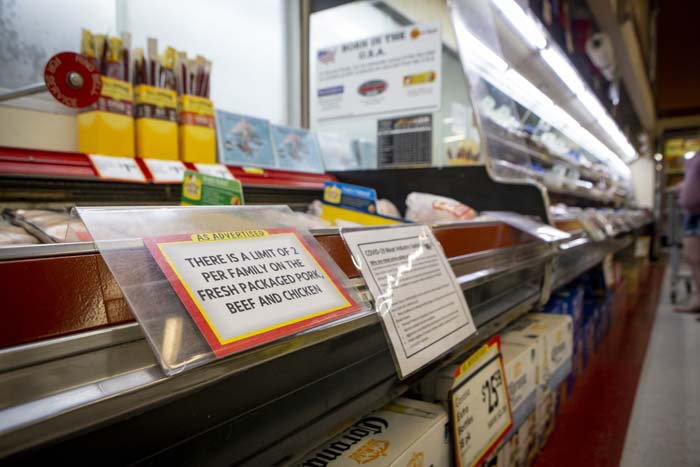COVID-19 outbreaks affect meat supply
Published 9:30 am Wednesday, May 13, 2020

- A sign limiting shoppers to two packages per family on freshly packaged pork, beef and chicken hangs in the deli aisle at Columbia Harvest Foods in Umatilla on Monday afternoon.
What’s for dinner? “It depends on what’s available at the local market” is going to be the answer for a while.
Trending
Consumers of beef, chicken and pork are being are being limited to how much they can buy during their trip to the grocery store, as processing plants have been shut down or have limited staff because of COVID-19 safety measures.
“This time of year, the 14 major (beef) processing plants would do about 640,000 animals a week,” said Pat Mallon, owner of Pat-N-Tam’s Beef in Stanfield. “Last week, it was 420,000. There’s a lot of cattle, but beef processing is down a third.”
That has people reaching out to privately owned businesses, such at Mallon’s.
Trending
Mallon, who sells to local establishments like the Broken Barrel in Stanfield, and Prodigal Son Brewery and Pub in Pendleton, also does a brisk business selling to individuals. And, they will deliver your order.
Mallon raises his own beef, and has it processed through smaller U.S. Department of Agriculture-inspected plants. With the COVID-19 issues, plants are running at less than 100%, and it’s taking longer than normal to fill orders.
“They are totally booked,” Mallon said. “Right now, we are out of specific cuts. We are selling more sides of beef, and we have a burger and roast program, which has 60 to 80 pounds of meat. We are figuring out ways to address our customers’ needs.”
The Tyson Fresh Meats plant in Pasco, Washington, shut down on April 23 after an outbreak among workers there, including a few Umatilla County residents who tested positive. They reopened on May 5 with additional safety precautions, including masks for employees and temperature checks.
Teresa Horn, who co-owns Eastern Oregon Mobile Slaughter in Hermiston with her husband Ted, said she has three to four rows of sticky notes with orders — about 40 as of Monday.
“It has been crazy,” Horn said. “We are so busy we can’t catch up. People got their stimulus checks and now they are stocking up on food. There is about a week’s wait for an order. If you want half a beef, it could be a minimum of a month.”
If you raise your own beef, Eastern Oregon Mobile Slaughter will process if for you. But for others, Horn said they rely on getting product from the processing plants to fill orders.
“As we get the meat, we are filling orders,” Horn said. “The phone has been ringing nonstop.”
While the smaller boutique beef processing companies are keeping plenty busy, the grocery stores are having to put limits on what people can buy — just like they still are doing with toilet paper.
Columbia Harvest Foods in Umatilla is limiting customers to two packs each of beef, chicken and pork.
“It’s happening everywhere,” owner Dave Meade said. “Safeway and Costco have had to do that too in this temporary disruption in the supply chain. We get inventory daily, but if you are missing half of your load, we have to make sure we can get everyone something.”
While restrictions have affected large families and those who like to meal plan and prepare for the week, Meade asks that shoppers be patient.
Janelle Carrera of Hermiston has a family of eight she has to keep fed. They do grocery pickup from Walmart, but have to go into the store to get meat — something they have had to do almost daily as of late.
“We try to shop in bulk for the week,” Carrera said. “Meal planning is a big thing for us. Right now, we have to plan to what is available. My three oldest are teenage boys. When I cook, it’s like cooking for a crowd.”
Carrera and her family make their own pasta or dumplings on a daily basis, and she cooks three meals a day.
“I don’t know where it all goes,” Carrera said. “They eat constantly. I’m lucky they will eat leftovers, if there are any. Because of the (meat) limit, I’ve had to get creative.”
Meade said he understands the frustration of the shoppers, but assures that it won’t last forever.
“We understand the frustration of the consumer,” Meade said. “Meat is essential, especially at dinner. We’ve been buying what we can. We have brought in ground turkey to try and fill the need. People may have to make multiple trips to the store, and that disrupts how they plan. We expect this to be over sooner than later.”









